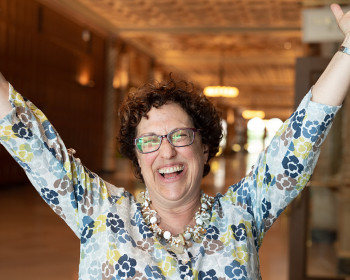Making a Difference Through the World’s First and Only Legal Clinic Devoted to Farmed Animal Protection
Annually since 1983, October 2nd is recognized as an international day of observance for farmed animals. At the Center for Animal Law Studies, we’re proud to be at the forefront of farmed animal advocacy every day of the year through our cutting-edge Animal Law Litigation Clinic—the world’s first and only legal clinic devoted to advancing protections for farmed animals.
Open gallery

Annually since 1983, October 2nd is recognized as an international day of observance for farmed animals. At the Center for Animal Law Studies (CALS), we’re proud to be at the forefront of farmed animal advocacy every day of the year through our cutting-edge Animal Law Litigation Clinic (ALLC)—the world’s first and only legal clinic devoted to advancing protections for farmed animals. In honor of World Day for Farmed Animals, we share below why and how CALS fights for farmed animals through the ALLC and, in the words of our ALLC students, why it’s important to advocate for farmed animals today, and every day.
Why Farmed Animals? Why Now?
Pamela Frasch, CALS’ Founder and Dean of the Animal Law Program at Lewis & Clark Law School, had an epiphany when considering the most effective means to raise awareness of the plight of farmed animals and advance their protection through the law. As a former litigator, and having taught Animal Law for almost twenty-five years, she knew that farmed animal litigation would provide a fertile training ground for law students, while providing valuable pro bono legal representation to those devoted to alleviating the suffering of farmed animals. “I knew it was a win-win. I felt that the creation of a clinic designed to advocate for farmed animals would also fit squarely within our mission at CALS to educate the next generation of animal law attorneys and advance animal protection through the law.”
That spark of an idea, coupled with essential grants from visionary supporters, allowed this game-changing approach to come to fruition in the 2019-20 academic year when CALS launched the ALLC. This endeavor utilizes the law school clinic model to allow ALLC attorneys and students to pursue novel legal causes without the constraints inherent to other settings. The Innocence Project, founded in 1972 at Cardozo Law School, served as a striking example of how law students can effectively pursue social justice causes under the guidance and mentorship of a practicing attorney. There, students work to exonerate the wrongly convicted and to reform the criminal justice system to prevent future injustice. In the ALLC, students, working under the guidance of an attorney, work on cases that are consistent with CALS’ goal of creating a legal system that respects and recognizes the interests of farmed animals.
Clinical Professor Delcianna Winders is Director of the ALLC. As is true for so many who do this work, her passion for advocating for farmed animals dates back to childhood, when two pigs she had bottle-raised were slaughtered, to her shock and dismay. She became an advocate when, soon thereafter, she learned about the institutionalized exploitation of farmed animals, who are commodified and treated as “products” in our legal system rather than living, feeling beings. “The magnitude of the suffering that billions upon billions of farmed animals endure is overwhelming and virtually impossible to quantify,” says Winders. “Through the ALLC, we bear witness and give voice to their suffering and use litigation to enforce the law or challenge laws that fail to adequately protect farmed animals.”
Last year alone, the ALLC donated 1,106 hours of pro bono services to more than a dozen clients. The ALLC is currently pursuing two cases against the United States Department of Agriculture (USDA) for its failure to protect pigs. The first case challenges the agency’s deregulation of pig slaughterhouses, while the second case takes USDA to task for its failure to protect downed pigs—pigs who are too sick or injured to stand or walk. Students are involved in all aspects of the work, learning valuable litigation skills in an area that they are passionate about—the lives and interests of farmed animals.
Student Advocates: Making a Difference
The ALLC is at capacity this year with seven students enrolled in the one-of-a-kind clinical opportunity. In honor of World Day for Farmed Animals, we asked our ALLC students if they would like to share why they feel it’s important to advocate for farmed animals. They enthusiastically accepted the offer, and we now share their responses to the question: “Why do you think it’s important to advocate for farmed animals?”
- “Farmed animals are one of the most vulnerable populations of beings in the world. Humans’ callous treatment of farmed animals reflects the lack of care and respect many humans maintain toward other vulnerable beings at every level of society. Therefore, advocating for farmed animals rejuvenates humanity’s integrity toward humans and non-humans. The advocacy’s ripples of impact improve the lives of myriad beings and prove that humans can, and do, make choices to act selflessly and with compassion.”
- Jessica Chapman, Animal Law LLM Candidate
- “The treatment of farm animals matters, not only because of the horrific abuse and inhumane treatment of the animals themselves, but because this wrongdoing impacts our facility workers, the health of anyone eating meat, and also the underserved communities living in close proximity to these facilities. We all deserve access to a safe work environment, disease-free food, and a healthy community to live in.”
- Tara Cooley, Animal Law LLM Candidate
- “If you ever get the chance to stand outside a slaughterhouse and interact with the six month old pigs that are about to meet their fate, you’ll notice each individual has different colored, tear-filled eyes–blue, brown, hazel–just like us. You’ll see the fear and blood in their eyes, the foam at their mouths, the severity of their wounds, and after the truck drives past you into the gates of the slaughterhouse, you’ll hear a wave of screaming from the pigs as they are prodded, poked, and herded to the kill floor. If you take a minute to process what each individual pig is about to experience, you’ll understand why it is so important to advocate for farmed animals. What those animals face inside the slaughterhouse is something most of us cannot even imagine, like something from a horror movie. They are conscious, they feel, they hurt, they love, and they live tortured lives. Their pain matters. It is up to us as animal advocates to be their voice. Instead of turning away from the pain, we need to wake up to what is going on, and use the law to make this world a safer place for them.”
-Kyla Dayton, 3L
- “Animals belong in our hearts, not our stomachs. When we turn our back to the cruel practices of farmed animals, we are turning our back to oppression in multiple forms. It is more important than ever to advocate for farmed animals and to understand them as living, feeling beings rather than a mere commodity.”
-Conor Lamkin, 3L
- “Farmed animal advocacy is a vital component in abolishing the interlocked systems of oppression in our country. Factory farming implicates animal abuse, worker safety, consumer health, environmental racism, and climate change. The level of abuse that farmed animals endure, and the rate at which it occurs, cannot be ignored.”
-Ellie Nicoletta, 3L
- “I believe it is important to advocate for farmed animals because they are, arguably, the animals most in need of legal advocacy in our country today. Firstly, in the few ways the law protects animals from cruelty, the cruel practices of the farming industry are widely accepted. This allows farmed animals to legally suffer inhumane treatment day after day. Secondly, the sheer number of animals in this abusive system is nearly incomprehensible: tens of billions of animals have been slaughtered this year alone. The magnitude of the suffering requires as many minds as possible to fight in a wide variety of ways to change, and (hopefully) eventually abolish, the system. Additionally, I think farmed animal advocacy brings to light the numerous serious problems outside of animal cruelty that industrialized farming causes our society. From environmental pollution and food safety concerns to workplace and employment violations, the industry affects us all—especially those least able to access justice.”
- Sarah Rogers, 3L
- “Advocating for farmed animals is particularly important because of the sheer number of animal lives impacted and the apparent lack of protection that they face. Billions of farmed animals are slaughtered each year in the US alone. Federal and state laws do not adequately protect these animals from inhumane treatment and cruelty. State anti-cruelty laws often provide many exemptions for common farming practices such as tail docking, intense confinement, and separating calves from their mothers immediately after birth. No federal law exists to regulate the treatment of farmed animals and they are in fact exempt from the Animal Welfare Act. Other federal statutes, like the Humane Methods of Slaughter Act, only require farmed animals to be handled humanely during slaughter and do not apply to turkeys, chickens, or other birds, millions of whom are slaughtered annually. Additionally, the administrative agencies tasked with enforcing such federal statutes often fail to take appropriate enforcement actions against slaughterhouses that repeatedly violate regulations. Each of these failures leaves farmed animals vulnerable to cruelty and inhumane treatment on an enormous scale. Advocating for better laws and stronger enforcement is necessary to ensure these animals get to live their lives free from suffering.”
- Brittney Rowe, 3L
How Can You Help?
If you’re inspired to learn what you can do to help farmed animals, consider the following:
- Learn about how farmed animals are treated under the law. Take this free downloadable webinar—Farmed Animals and the Law—with Lewis & Clark Law School Professor of Practice and animal law pioneer, Joyce Tischler, as she provides a comprehensive overview of laws affecting the billions of farmed animals in the United States.
- Donate to CALS to support the work of the ALLC, as we work to train future leaders in farmed animal protection and change the legal landscape for billions of farmed animals.
- Support legislation and other advancements to improve farmed animal protection. Whether at the federal, state, or local level, the law has a long way to go to catch up with how society feels that farmed animals should be treated, with kindness and compassion.
- Consider how you may contribute to the suffering of farmed animals in your daily choices, through diet, clothing, lifestyle, and more. Ask how you can have a softer footprint and, through your individual choices, reduce the suffering of farmed animals.

The Center for Animal Law Studies (CALS) was founded in 2008 with a mission to educate the next generation of animal law attorneys and advance animal protection through the law. With vision and bold risk-taking, CALS has since developed into a world-renowned animal law epicenter, with the most comprehensive animal law curriculum offered anywhere. In addition, CALS is the only program that offers an advanced legal degree in animal law and three specialty Animal Law Clinics, including our newly launched International Wildlife Law Clinic. CALS is a fully self-funded nonprofit organization operating under the Lewis & Clark College 501(c)(3) tax-exempt status, and is only able to provide these educational opportunities through donations and grants.
More Center for Animal Law Studies Stories
Center for Animal Law Studies is located in Wood Hall on the Law Campus.
MSC: 51
email cals@lclark.edu
voice 503-768-6960
Center for Animal Law Studies
Lewis & Clark Law School
10101 S. Terwilliger Boulevard MSC 51
Portland OR 97219

